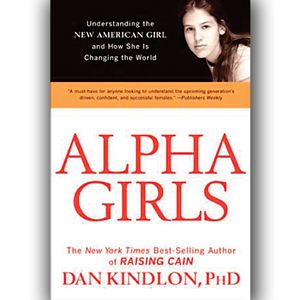 This March, in honor of Woman’s History month, I decided to blog about Alpha Girls: Understanding the New American Girl and How She Is Changing the World by Dan Kindlon. While many social scientists argue that adolescent girls are psychologically disadvantaged compared to their male peers, Kindlon dispels that theory. As a mother of two girls, I wanted to find out more about the compelling studies and interviews that comprise his research. Alpha Girl claims that the new American girl is a born leader with the ability to reap the full benefits of the women’s rights movement. As far as Kindlon is concerned, alpha girls have the confidence and drive to leave their mark on the world.
This March, in honor of Woman’s History month, I decided to blog about Alpha Girls: Understanding the New American Girl and How She Is Changing the World by Dan Kindlon. While many social scientists argue that adolescent girls are psychologically disadvantaged compared to their male peers, Kindlon dispels that theory. As a mother of two girls, I wanted to find out more about the compelling studies and interviews that comprise his research. Alpha Girl claims that the new American girl is a born leader with the ability to reap the full benefits of the women’s rights movement. As far as Kindlon is concerned, alpha girls have the confidence and drive to leave their mark on the world.
What’s the difference between this generation and the last? According to Kindlon’s research, “For psychological transformation, a girl needs to be born into a society in which women’s status is already high.” In other words, while Title IX was passed the year before I was born, I grew up in a society that hadn’t fully embraced the expectation for girls to perform and compete athletically the way my daughters’ generation has. As far as Alpha Girls is concerned, the only thing the girls interviewed thought they couldn’t do was play pro football. It’s this sense of entitlement when it comes to equality that sets them apart.
One of the most striking differences noted between the generations was an allegiance towards feminism. Kindlon claims, “Despite all the benefits they had gained from feminism, few of the girls we interviewed considered themselves to be feminists. They associated feminism with an overly aggressive, anti-male attitude.” Rather what alpha girls want is for all people to have the same opportunities.
The alpha girl generation essentially began in the later 1980s, a time when women began to outnumber men in college. “In the 2004-2005 academic year, 59 percent of all degrees were granted to women,” writes Kindlon. Surveys show that alpha girls have close relationships with their mothers, 75 percent of which work outside the home reports Kindlon. But it’s the alpha girl’s relationship with her father that seems to have had the biggest effect on her.
“By cultivating closeness to their daughters, fathers are both deliberately and unconsciously passing along to their girls what I call male ways of being,” argues Kindlon. It’s something that extends beyond feeling comfortable working with and competing against male peers. At least a third of all alpha girls feel as close to their father as they do their mother, Kindlon claims. With fathers no longer enforcing traditional models of femininity, this direction has a direct impact on daughters’ lives.
Kindlon’s research shows that in general alpha girls are less tense than non-alpha girls. The theory is that since fathers play very differently than mothers do cultivating that relationship enables girls to be more eager to try new things. Kindlon sites the work of Margaret Henning, author of The Managerial Woman, who argues “one of the biggest benefits to businesswomen of having involved fathers is that they teach their daughters not to be afraid of risk taking.”
Now, the importance of the father-daughter bond was something I read about previously and it’s part of the reason I’ve always encouraged my children’s chess games with their father. However, the first part of Alpha Girls presented research that showed a father’s influence went beyond the psychological and this new information fascinated me. Kindlon writes, “A remarkable 1999 study led by Bruce Ellis at Vanderbilt University found that the age at which a girl begins puberty – her first menarche – can be predicted by the quality of her relationship with her father.” Apparently, young girls know on a biological level whether men are critical to their child care. If one is not there, Kindlon explains, her biochemistry “pushes her to start bearing children as soon as possible.”
Don’t mistake me. Alpha Girls doesn’t suggest that young women are casting away mom’s identity in favor of dad’s or ungrateful for the women who paved the way for them; rather, Kindlon argues, “They are choosing to broaden their repertoire and learn a range of skills that have been traditionally associated with both masculinity and femininity.” In other words, stop worrying that your daughter’s adolescence will be all doom and gloom. There’s never been a better time to be a girl.
Follow @WinterhalterV on Twitter for updates on blog posts or like Parenting by the Book on Facebook.
Read my other blog Befriending Forty.



